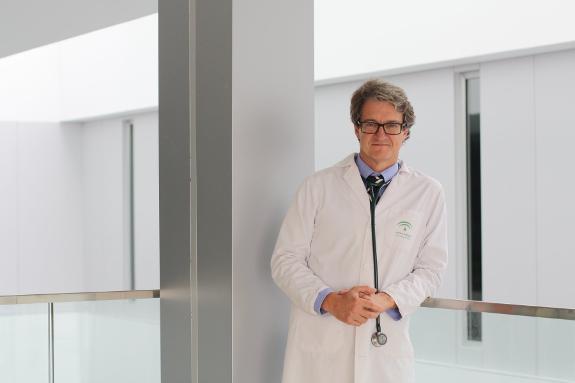"There are people who worry more about their car than their heart"
This expert says that more than 75% of cardiology patients should have a single appointment and all the tests done on the same day
Ángel Escalera
Viernes, 5 de octubre 2018, 09:51
The key to preventing cardiac problems is for people to look after their heart, explains Juan José Gómez Doblas, the president of the Andalusian Heart Foundation and head of the Cardiology Department at the Clínico hospital, in this interview. Last Saturday, 29 September, was World Heart Day. This expert believes that more than 75 per cent of cardiac consultations should be a single-appointment system, so that patients can have all the tests they need on the same day.
Generally speaking, how healthy are people's hearts in Andalucía?
Although there have been improvements, cardiovascular health in Andalucía is among the worst in the country, especially in terms of mortality rates.
Is there a scientific explanation for that?
There are several. One is that the Andalusians have the highest levels of obesity and diabetes. Another determining factor is the socio-economic level, which in Andalucía is lower than in other regions of Spain. That has a direct relationship with cardiovascular mortality.
Are we going the right way in terms of preventing heart problems?
It depends on the type of prevention we are talking about. In terms of patients it is evident that everyone of us, individually, has some type of risk factor that we don't control and should control better. It is a matter of convincing people of that. With regard to health services, what happens is that we dedicate ourselves almost completely to assisting people after a problem has arisen. We have little time for prevention, although GPs do advise their patients. Many more resources are dedicated to the immediate problem, and not on prevention. For the same cost we could have many more benefits, but it would be in the long term.
At what age should people check the condition of their hearts, as a preventive measure?
We should have a check-up to establish our cardiovascular risk from the age of 40 and, depending on the risk, there should be a preventive strategy. On one hand, there is secondary prevention: the type that occurs after a heart attack. On the other we have primary prevention, which is when risk factors are controlled before a heart attack or stroke, but there is something even more important which we still don't do, and that is primordial prevention.
What does that consist of?
Stopping people getting to a point where they have risk factors. That is something that needs to be done in childhood. Treating someone who has high blood pressure and is obese and diabetic is a sign of failure. It would be ideal for that person never to have ended up inthat situation. To achieve that, we need primordial prevention from childhood.
What are the principal risk factors for the heart?
Smoking, cholesterol, diabetes, hypertension and a sedentary lifestyle, and of course obesity. There are also risk factors we can't control, such as family history and age.
Do more men suffer from cardiac problems than women, or are the numbers about the same?
People have the impression that men suffer more from cardiac problems, but in reality that isn't the case because women are also affected. In fact, women with a cardiac illness have a higher death rate than men. In other words, their treatment is worse, it comes later and they have a higher mortality rate than men. Heart problems occur more frequently in younger men, but on the other hand they are more common in older women.
Generally speaking, do we ill-treat our hearts or do we look after them as they deserve?
I believe we are looking after our hearts better these days and we are more aware that the heart is very important. Even so, I still think we don't pay enough attention to it. Most people will worry about their car, for example, but don't care that they need to lose 20 kilos. Some people seem to care more about their car than their heart, but their heart is much more important for their future than a vehicle.
Within the context of the Andalusian health service, what position does the Clínico Hospital's cardiology service hold?
When Eduardo de Teresa took over as head of the cardiology service 25 years ago it began to grow, and we are now a national benchmark in several fields related with the heart. There are more and more patients these days, and they are older. That's why there is such a need for state-of-the-art technology. We plan to continue growing, slowly but surely.
Are you overwhelmed by the increase in the number of patients?
We never grow at the same rate as the demand. We adapt as best we can. Right now we have a very good response in cardiac surgery and treatment for arrhythmias. We have some delays in consultations, which we try to improve by a single-appointment system, in other words patients have their tests and receive the diagnosis on the same day. That's what we are doing at the Guadalhorce hospital, and we want to introduce the same system at the San José Obrero specalist centre, the one known as Barbarela. We want to become as agile as possible.
The single-appointment system will definitely help, of course.
Yes, because it resolves patients' problems and shortens delays. It's much better for people to have all the tests on one day than to have to wait six months. We hope that 75 per cent of all consultations will be single-appointment eventually.
What challenge have you set yourself as president of the Andalusian Heart Foundation?
I plan to work hard on primordial prevention and I would like it to be implemented at a very young age, in schools.
